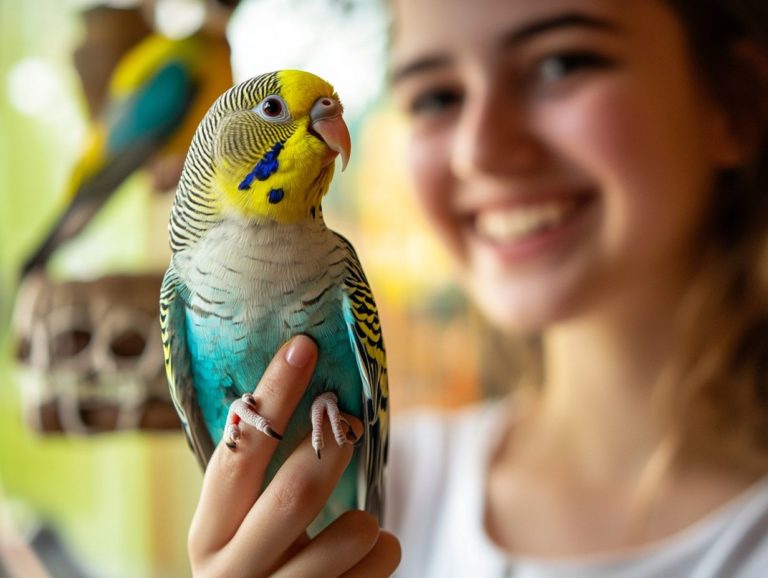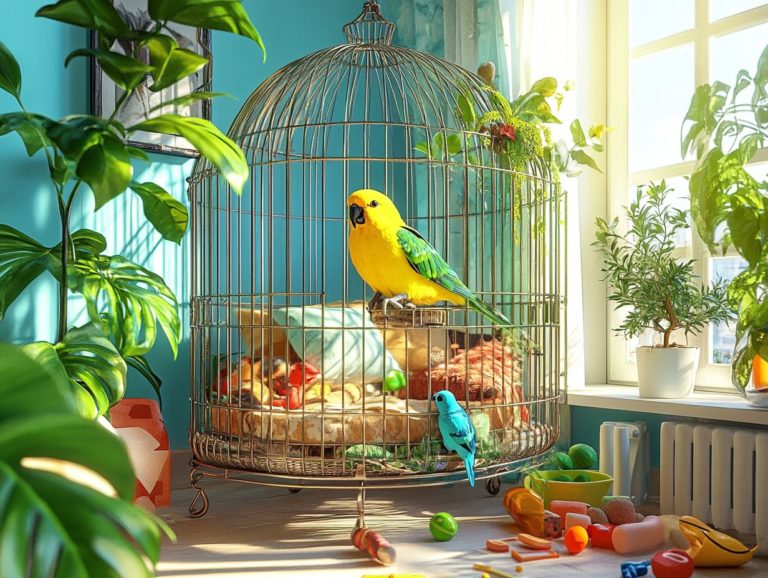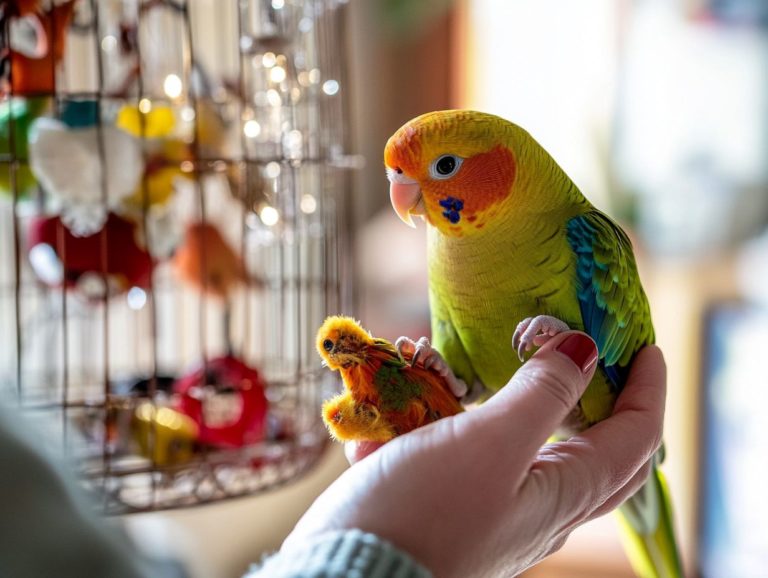5 Essential Care Tips for Newly Adopted Birds
Bringing a new bird into your home is an exhilarating journey that promises joy and companionship. However, it also entails responsibilities vital for ensuring your bird flourishes in its new environment.
This article explores five essential care tips designed to help you create an inviting space, establish a normal routine, and nurture a strong bond with your newly adopted bird. From closely monitoring its health to providing comfort, each step is fundamental for fostering a happy and healthy pet.
Get ready to transform your home into a sanctuary for your avian companion and ensure its happiness and safety!
Contents
- Key Takeaways:
- 1. Introduce Your Bird to Its New Environment Slowly
- 2. Provide a Comfortable and Safe Living Space
- 3. Establish a Routine for Feeding and Cleaning
- 4. Spend Quality Time with Your Bird
- 5. Watch Your Bird’s Health and Behavior
- What Should You Consider Before Adopting a Bird?
- Frequently Asked Questions
- What are the 5 essential care tips for newly adopted birds?
- What should I feed my newly adopted bird?
- How can I create a safe living space for my newly adopted bird?
- Why is socialization and exercise important for my newly adopted bird?
- How often should I groom and clean my newly adopted bird?
- Why is finding a trusted avian veterinarian important for my newly adopted bird?
Key Takeaways:
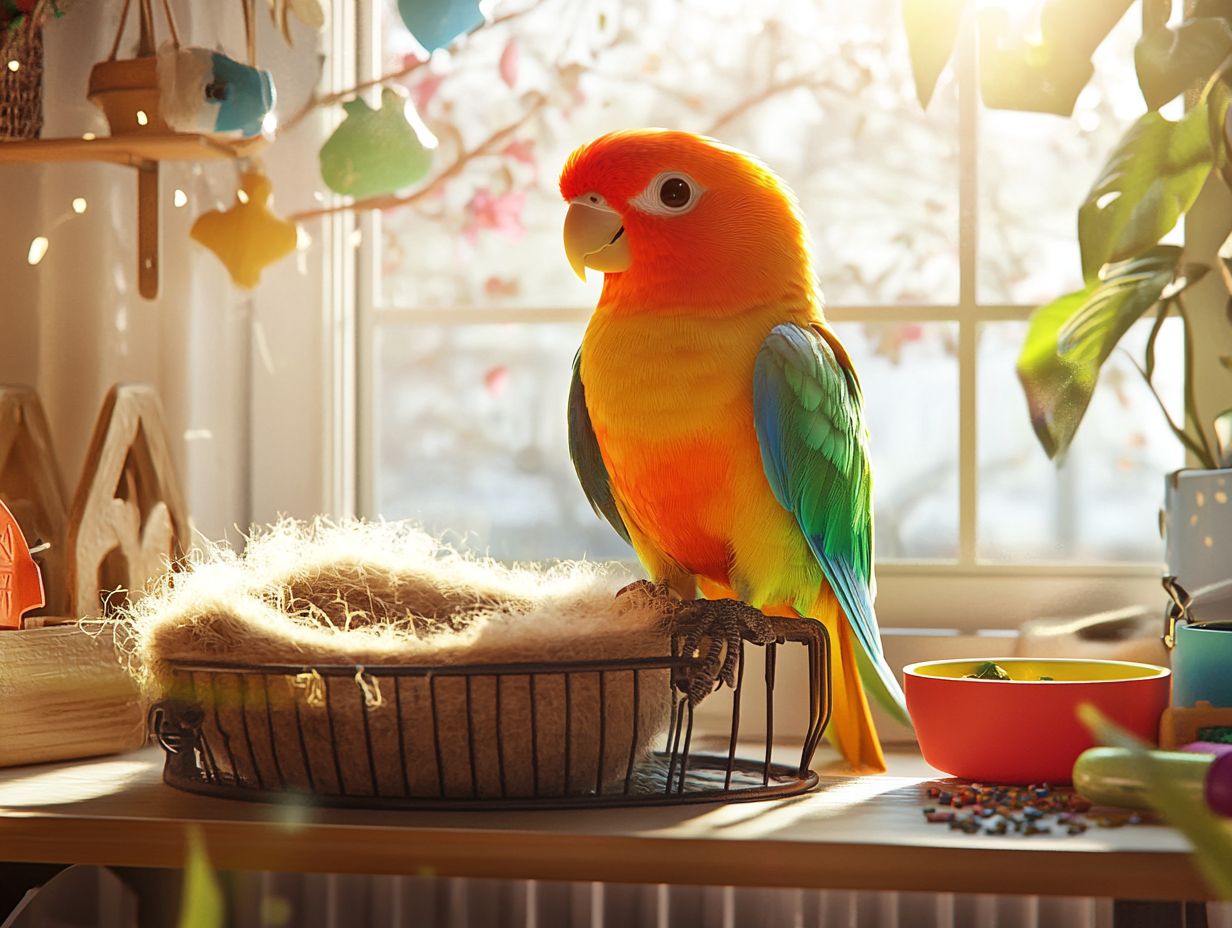
- Introduce your bird to its new environment slowly to avoid overwhelming it and causing stress.
- Provide a comfortable and safe living space with suitable perches and toys, essential for exploration and emotional well-being.
- Establish a routine for feeding and cleaning to maintain your bird’s health and happiness.
1. Introduce Your Bird to Its New Environment Slowly
Introducing your bird to its new space is a crucial step for a smooth move. Give it the time to acclimate while closely observing its body language. This approach nurtures positive interactions and helps prevent feeling stressed.
Creating a safe space is vital, offering a comforting retreat for your bird to explore at its own pace. Lowering noise levels during the initial days can significantly reduce stress, allowing your feathered friend to feel secure.
Pay close attention to its reactions; any signs of fear or discomfort should be addressed immediately. Establishing a stable routine can also work wonders, as predictability fosters confidence.
Use strategies such as gentle interactions, introducing familiar objects, and gradually exposing your bird to new sounds. For more specific advice, consider these quick tips for feeding your bird. This thoughtful approach will help ease trauma during this adjustment phase, leading to a happier, more confident pet.
2. Provide a Comfortable and Safe Living Space
Creating a comfortable and safe living space for your bird is essential. Ensure that its cage is appropriately sized, allowing for freedom of movement and regular cleaning to maintain a healthy habitat and prevent behavioral issues.
Choosing the right cage size is crucial; it should be spacious enough for your bird to stretch its wings fully and move around easily. The bars’ spacing (the distance between the bars of the cage) should not be too wide, preventing escapes or injuries.
Consider incorporating enrichment options like perches made from various materials and sizes, toys that stimulate mental activity, and safe branches for climbing. These features play a vital role in keeping your bird engaged and content.
Make sure that all materials used in the cage are non-toxic. This significantly contributes to your bird’s safety and well-being. A clean environment, where the cage is regularly maintained and clutter is minimized, allows your bird to thrive both emotionally and physically, evident in its overall behavior.
3. Establish a Routine for Feeding and Cleaning
Establishing a consistent routine for feeding and cleaning your bird enhances its overall health and longevity while cultivating trust and companionship through reliable daily interactions.
Ensure an optimal diet rich in fruits and vegetables, as it provides the vital nutrients necessary for promoting well-being and energy. Balancing seeds and pellets caters to your bird s diverse dietary needs, resulting in a happier, more energetic pet.
Incorporate regular cage cleaning into your feeding schedule to create a hygienic environment for your bird, effectively preventing illness. Schedule vet visits and integrate health checks into this daily routine to catch any potential issues early, ensuring your bird enjoys a long, healthy life filled with companionship.
4. Spend Quality Time with Your Bird

Spending quality time with your bird helps create a strong bond. Regular interaction satisfies emotional needs and encourages positive behaviors.
Engage in gentle handling, playful games, and meaningful conversations to enhance your connection. Regular exercise is vital for physical health and satisfies your bird s curiosity.
These activities reduce stress and create a sense of safety. Establishing a routine of enriching experiences builds trust, helping both you and your bird thrive.
5. Watch Your Bird’s Health and Behavior
Keep an eye on your bird’s health and behavior to catch problems early. Spotting signs of illness allows for timely care.
Watch for changes in sounds, activity, or appetite to prevent issues from escalating. Regular vet check-ups are essential for overall health.
If your bird seems lethargic or has strange droppings, take action. Monitoring behavior strengthens your bond and keeps your feathered friend vibrant.
What Should You Consider Before Adopting a Bird?
Before adopting a bird, consider the long-term commitment involved. It’s important to understand its personality and assess the financial responsibilities of care, including essential care for adopted parrots.
Explore different species to find a feathered companion that fits your lifestyle. Birds, like all pets, need socialization and mental stimulation.
Taking in a bird in need not only gives it a loving home but also brings you joy from making a real difference.
How Can You Prepare Your Home for a New Bird?
Creating a safe and welcoming home for your new bird is essential. This environment will help your bird thrive and feel secure, and knowing how to bond with your newly adopted bird can further enhance their comfort and happiness.
Remove hazards like exposed wires and small objects. Place the birdcage in a quiet yet engaging spot for your bird to feel comfortable.
Include various toys and activities to promote exercise and mental stimulation. It’s crucial to keep the environment clean to prevent illness and support overall health.
What Are the Essential Supplies for a New Bird?
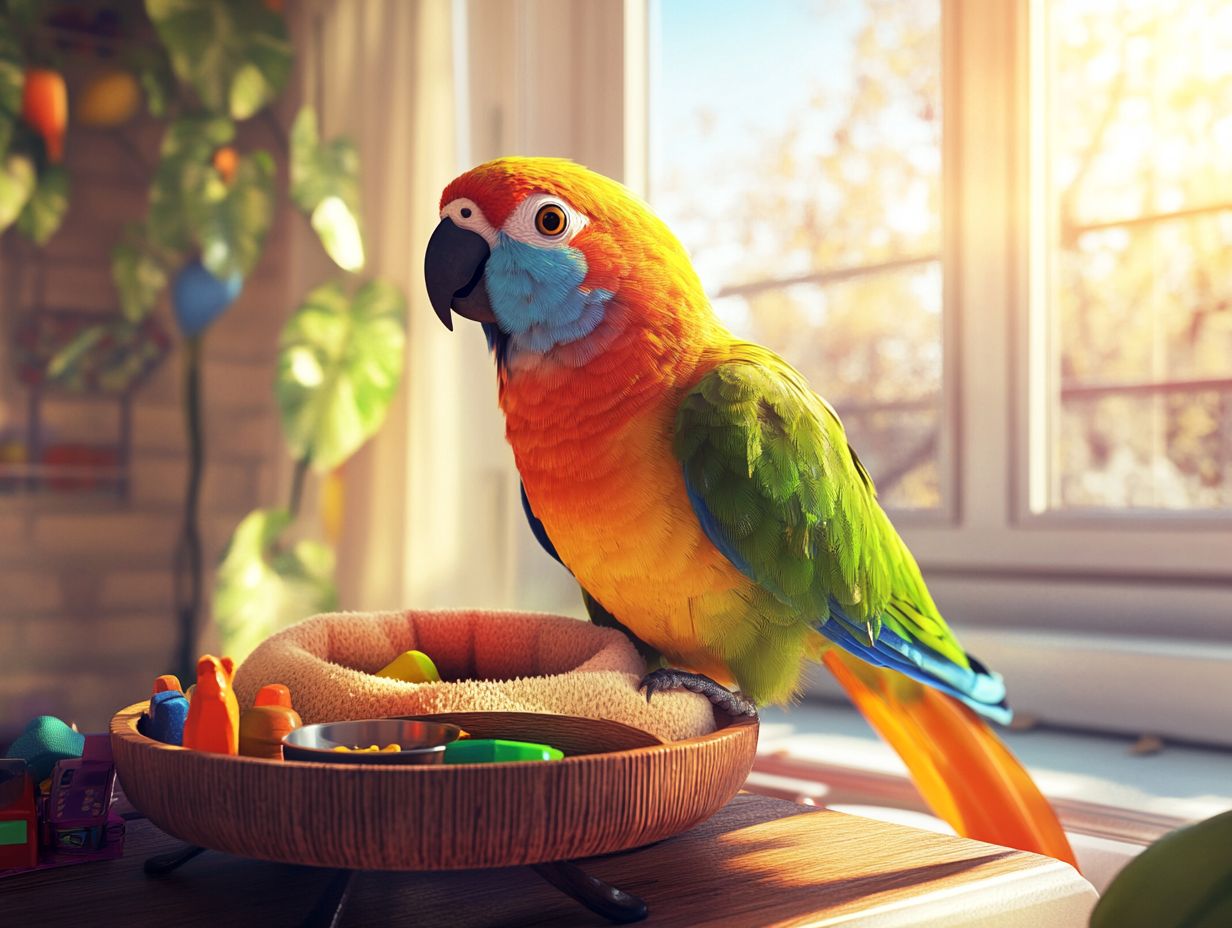
Essential supplies for your new bird include a spacious and secure cage, a nutritious diet tailored to its needs, engaging toys, and access to veterinary care, along with socialization tips for newly adopted birds, all vital for its well-being and happiness.
To create a comfortable habitat, incorporate natural perches made from untreated wood. These help keep your bird s feet healthy and provide necessary exercise and opportunities for exploration.
A variety of chewable and shreddable toys crafted from safe materials will encourage mental stimulation and stave off boredom.
A balanced diet featuring high-quality pellets along with fresh fruits and vegetables ensures your bird receives optimal nutrition. Maintaining a clean environment is essential. Use non-toxic disinfectants and easy-to-clean liners to support your bird s health.
How Can You Bond with Your Newly Adopted Bird?
Bonding with your newly adopted bird requires a touch of patience and a dash of positive reinforcement. To aid in this process, consider following 5 tips for transitioning your bird post-adoption. Engage in consistent interaction and tune into its body language to cultivate trust and foster a meaningful companionship.
Engaging in gentle conversations will deepen this connection. Your familiar voice can provide much-needed comfort.
Use training techniques that reward good behavior with treats to encourage your bird to interact and respond more favorably.
Incorporating playful activities into your routine keeps the experience enjoyable for both of you. Regular interaction strengthens your bond with your bird, boosting its happiness.
Pay attention to your bird’s reactions during these interactions. Recognize when it feels overwhelmed or anxious, and adapt your approach to ensure its comfort is always prioritized. This attentiveness makes a big difference in building a special bond!
What Are the Common Health Issues in Newly Adopted Birds?
Newly adopted birds may encounter common health issues, such as psittacosis (a type of bird disease) and Chlamydiosis (another bird disease). To ensure your cockatiel thrives, consider following these 5 tips for caring for your first cockatiel and schedule that first vet check-up without delay to catch any underlying problems or trauma early on.
These conditions, along with respiratory infections and feather plucking, can greatly affect their overall well-being. Prioritize regular veterinary visits for diagnosis and expert guidance on proper care and nutrition.
A bird s behavior often serves as a crucial indicator of health issues. Signs like lethargy, loss of appetite, or changes in vocalization could signal distress. By keenly observing these signs and committing to routine wellness checks, you can catch potential problems early, ensuring a happier and healthier life for your feathered companions.
How Can You Create a Comfortable Environment for Your Bird?
Creating a comfortable environment for your bird is all about providing adequate space, a secure habitat, and meeting its emotional needs through social interaction and stimulation. This ensures your feathered friend feels safe and joyful in its surroundings.
The dimensions and layout of the cage are crucial, as they determine how freely your bird can move and explore. Thoughtfully placing an assortment of toys can ignite its natural curiosity, offering both mental and physical engagement.
Establish a quiet corner in the living area a little sanctuary for your bird to rest and reflect, minimizing stress. Including playtime and companionship in their daily routine is essential.
Frequently Asked Questions

What are the 5 essential care tips for newly adopted birds?
The 5 essential supplies for newly adopted birds include providing a nutritious diet, ensuring a safe and comfortable living space, establishing a routine for socialization and exercise, regular grooming and hygiene, and finding a trusted avian veterinarian.
What should I feed my newly adopted bird?
Your newly adopted bird needs a fun mix of fresh fruits and vegetables, along with a high-quality seed or pellet mix. To learn more about creating the perfect environment, check out how to give your adopted bird a happy home. A varied diet keeps your bird happy and healthy!
How can I create a safe living space for my newly adopted bird?
Make your bird’s home safe by removing hazards like toxic plants, electrical cords, and small objects. Provide different perches and a spacious cage for plenty of room to move around.
Socializing and exercising are key for your bird’s physical and mental health. Playtime with you, other birds, and engaging toys is essential!
How often should I groom and clean my newly adopted bird?
Regular grooming is crucial. Trim your bird’s nails and beak, give baths, and keep their living space clean to prevent illness.
Why is finding a trusted avian veterinarian important for my newly adopted bird?
Finding a trusted avian vet is essential for your bird’s health. Regular check-ups and specialized care ensure your feathered friend stays well and happy!

